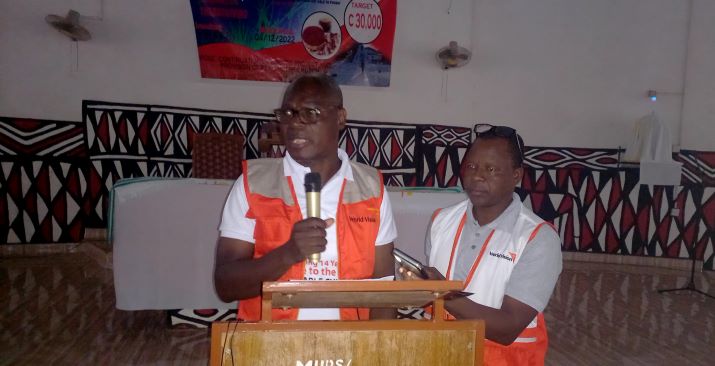By Anthony Adongo Apubeo
Sirigu (U/E), Sept 17, GNA – Some chiefs and people of the Kassena-Nankana West District of the Upper East Region have lauded World Vision Ghana, a faith-based international organisation for its contribution towards improving livelihoods in vulnerable communities.
They said through the project dubbed, “Kassena-Nankana East Area Programme,” various interventional programmes had been implemented to build resilient communities, improved access to education, health and provided economic empowerment to families.
These came to light at a durbar at Sirigu to close the project implementation in the area after 13 years.
Naba Roland Akwara Atogumdeya III, the Paramount Chief of the Sirigu Traditional Area, noted that major communities such as Sirigu, Mirigu, Kandiga and Nabango where the project was being implemented had seen significant transformation in the lives of the people.
He said apart from safe Water, Sanitation and Hygiene (WASH) facilities and services in their communities, schools and healthcare facilities, the standard of education in the area had also improved with many school children able to read and write.
Mr Gerald Ataogye, the Kassena-Nankana West District Chief Executive, said the district had adopted and mainstreamed some of the best practices in sanitation, Education, and child welfare, introduced by World Vision and replicated the same in many parts of the district.
Mr Dickens Thunde, the National Director, World Vision Ghana, said the NGO also invested approximately GHC 20,700,000.00 in the area of WASH facilities and services, basic education improvement, livelihood empowerment, food security, and sponsorship and child protection advocacy interventions among others, reaching over 30,000 people.
On WASH, he said, a total of 152 boreholes with five limited solar powered mechanised water systems had been constructed and installed for 123 communities, 11 schools and nine healthcare facilities, with about 45,600 gaining access to safe drinking water.
He said, 142 functional Water and Sanitation Management Teams had been formed and trained and supported with borehole maintenance tool kits to manage the facilities, and more than 2,700 latrines had been constructed at the household level for 16,200 people, resulting in 74 communities attaining open defecation free status.
“Through capacity building for local artisans, they have been equipped in latrine construction to support communities and households construct and use latrines. These, coupled with appropriate handwashing behaviour interventions, have reduced the prevalence of diarrhoea in children under five to as low as eight per cent from 23 per cent five years ago in intervention areas,” he said.

On education, Mr Thunde said the standard of education in the area had improved significantly through the training of 126 basic and early childhood teachers, establishment of 32 after school reading camps with books banks, provision of over 10,000 reading materials and 3,000 bicycles.
He said 55 per cent from the initial 0.2 per cent of children in the areas were able to read age-appropriate books with comprehension and 80.5 per cent of children able to recognise concepts of print while 94 per cent of children commuting from long distances to school had bicycles.
“Because of this, the daily school attendance currently stands at 99 per cent from 70 per cent, the rate of primary school drop-out is now three percent from 20 per cent while 98 per cent of children now learn at home after school,” he said.
He said apart from providing financial independence through the formation of 216 savings for transformation groups, World Vision had also contributed to the reduction of child marriage, exploitation, abuse, and neglect.
GNA